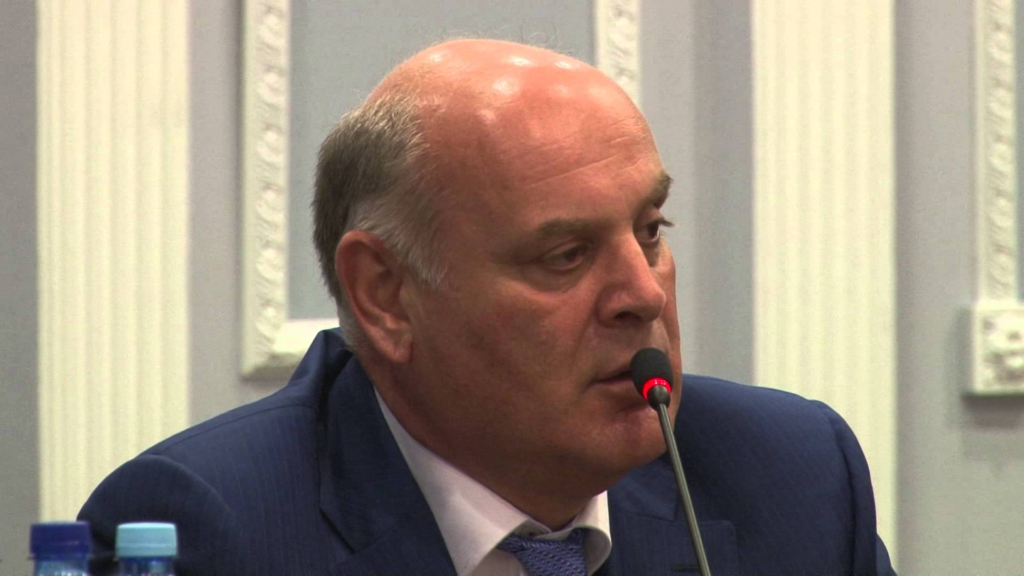Will key oppositionist become the Abkhazian parliament speaker?
Photo:Ibragim Chkadua
March 12 parliamentary elections in Abkhazia haven’t distinctly outlined a new composition of the People’s Assembly, the main legislative body of Abkhazia.
Nevertheless, some milestone events could be pointed out based on the results of the first round.
Valery Bganba, the speaker of yet-incumbent parliament, has lost the election and Batal Tapagua, CEC ex-Chairman, has been elected.
But, most importantly, the outcome of the first round is that ex-President of Abkhazia, and now the key opposition politician, Alexander Ankvab, secured the victory in one of the constituencies in Gudauta.
Key oppositionist, Alexander Ankvab and his prospects
 Alexander Ankvab
Alexander Ankvab
It was a narrow victory. His lead over Ruslan Gagulia, the amateur politician and Ankvab’s only rival, made just 11 votes.
After ex-President Alexander Ankvab, gained the MP mandate, many analysts have started making predictions that he would be elected the People’s Assembly Speaker. But even if following the electoral process the majority of MPs seats go to the opponents of the incumbent President, Raul Khajimba, in view of the current tendencies in the opposition environment, it will be extremely hard for Alexander Ankvab to become the speaker.
Even in once-uniform opposition bloc, there have been great differences in the recent months not only over the strategy and tactics of further struggle for power, but also with regard to a person who is supposed to head that very oppositional environment.
Now, after the ex-President’s return to active political life, there has been actually a tacit split into those, who out of old stainless love, keep putting a stake on Ankvab, as well as those, who stand ready to support Aslan Bzhania as their leader.

Aslan Bzhania
Putting stake on Ankvab is mostly conditioned by an emotional factor. Proceeding from age qualification requirement for country’s top official, which is enshrined in the Constitution, a path to the presidential chair is actually blocked for Alexander Zolotinskovich, who is already 64.
An opposition leader, who enjoys popularity, but who has no career advancement prospects, is a great problem, first of all, for the opposition itself. In this regard, Aslan Bzhania’s figure, though less popular among the opposition electorate, still seems to be a more promising project rather than promotion of Alexander Ankvab.
This hidden rivalry of two ambitious politicians could be observed already in Atar constituency, where Bzhania stood as a candidate.
His competitor, Temur Kvitsinia, with whom he made it to the second round, is also an oppositionist. He is neither an ordinary oppositionist, nor has he ever been enlisted among the leaders. His ‘master card’ in a claim to MP mandate is his second name: representatives of Kvitsinia clan make up almost half of the electorate of the given constituency. And, as a rule, they amicably vote for their relative.
Temur Kvitsinia, who, by the way, is said to be the most silent MP, certainly would have had no chances to be elected in any other constituency. But his rate is almost unbeatable in Atar constituency. He won parliamentary elections there twice in succession, confining himself exclusively to the first round, which seems to be a fantastic result for the present-day Abkhazian realities.
Nevertheless, as it is said in the opposition backstage, Temur Kvitsinia initially wasn’t going to stand as a candidate, having decided to give way to Bzhania. However, later, as the same sources emphasize, he suddenly changed his mind and this turnaround reportedly happened with the support of ex-President, Alexander Ankvab.
No matter what the outcome of the election is, a sediment formed in Ankvab-Bzhania relations will certainly further develop.
Young opposition- Aynar and its prospects
There will be another group of oppositionists in the new Parliament. And these are, first of all, the representatives of Aynar party.
This organization brings together a young generation of Abkhazian politicians, who are already referred to in the Russian media as the nationalists.
Aynar prefers to present itself as a real opposition not only to the incumbent authorities, but also to the Bloc of opposition forces.
And this peculiarity will add extra color to both, the opposition that has gained seats in Parliament, as well as to the Parliament itself.
However, even Aynar has been facing many problems with regard to who exactly will represent the party in Parliament.
The reason behind those problems is that the Abkhazian parliament is elected through the majoritarian system. Regrettably, this system obviously outlived itself and the current election campaign proved that- it was a competition of good guys, rather than a contest of the ideas and programs.
For the same reason, it can’t be said that the new parliament will become crucial for the Abkhazian history. It is more likely to be a continuer of the traditions of the previous parliamentary convocations.
However, this parliament is the last one elected through the majoritarian system. The electoral system reform has been already launched and the bill on transition to the mixed majoritarian-proportional system has already passed its second in Parliament. Thus, this election is the majoritarian system’s ‘swan song’.
Now everyone is trying to guess: who will be more in the new parliament, oppositionists or pro-government MPs. But even when the names of all 35 will be announced, it will be very hard to say, what this parliament is like – is it oppositional or pro-governmental.
The majority of MPs in the Parliament of last convocation initially had supported then-incumbent authorities, embodied by Alexander Ankvab. However, later, in May 2014, the opposition forced Ankvab to resign ahead of term and the balance of powers in the People’s Assembly changed by default. The majority started supporting a new leader, Raul Khajimba.
The new Parliament will certainly be quite flexible and will meet the political conjuncture that will be formed in certain moments of Abkhazian history.























